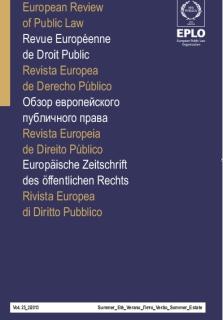
Constitutional Law / Droit constitutionnel
2012
RUSSIA / RUSSIE
SERGEY A. BELOV
PhD, Associate Professor of Constitutional and Administrative Law,
Law Faculty of St. Petersburg State University
OLGA A. KUDRYASHOVA
PhD, Assistant Professor of Constitutional and Administrative Law,
Law Faculty of St. Petersburg State University
DENIS A. KUCHERYAVTSEV
Chief Legal Expert of the Legal Department, St. Petersburg Charter Court Secretariat
Russian constitutional law and jurisprudence development in 2012 had two general tendencies. The first tendency appeared as concessions to the political opposition and a result of the 2011 mass manifestations leading to a minor political reform, namely return to the direct election of the governors with a newly established 'municipal filter' of collecting signatures from municipal officials and liberalization of registration of political parties. The second tendency became more general and more obvious. It was about taking measures of conservation and protection of the political system, also being a reaction to the mass protests actions. These measures were: toughening liability for violations of public order, implementing in the Russian legislation the term of 'foreign agents', protection of national cultural values, including the defense of children morality. A number of political and legal measures were the object of lively public discussions, others (e.g. limitation of the right to be elected for already convicted persons) were left without visible public reaction. Most of the major political events were reflected in the court practice and developed on the legal level, usually being challenged by the opponents of the proposed decisions (the challenging of joining the WTO could be the best example). Still many legal decisions will have consequences only in the future.
En 2012, le droit constitutionnel et la jurisprudence en cette matière se sont développés en Russie selon deux tendances générales. La première est apparue comme des concessions à l'opposition politique et comme une conséquence des grandes manifestations de 2011 et a mené à une réforme politique mineure, à savoir le retour aux élections directes des gouverneurs, avec l'établissement d'un nouveau "filtre municipal" consistant à réunir des signatures d'officiels municipaux et une libéralisation de l'enregistrement des partis politiques. La seconde tendance a été plus générale et plus évidente. Elle a consisté en la prise de mesures de conservation et de protection du système politique, tout en étant une réaction aux actions de protestation de masse. Ces mesures ont été les suivantes: renforcement de la responsabilité pour les atteintes à l'ordre public, introduction dans la législation russe des termes "agents étrangers", protection des valeurs culturelles nationales, y inclus la défense de la moralité des enfants. Un certain nombre de mesures politiques et législatives ont suscité de vifs débats publics, d'autres (comme la limitation du droit d'éligibilité pour les personnes ayant fait l'objet d'une condamnation) ont été prises sans réaction publique visible. La plupart des événements politiques importants se sont reflétés dans la pratique des tribunaux et ont été développés sur le plan juridique, généralement en étant contestés par les opposants aux décisions proposées (la contestation de l'adhésion à l'OMC pourrait être le meilleur exemple). Beaucoup de décisions juridiques n'auront d'effets que dans le futur.





















